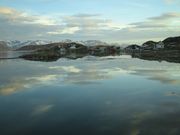 U.S. Partners to Address Water Scarcity in the Middle East: Local efforts key to adapting to climate change
U.S. Partners to Address Water Scarcity in the Middle East: Local efforts key to adapting to climate change
Climate change may provoke fears of melting polar ice caps and rising sea levels, threatening to drown entire countries, but for the Middle East and North Africa (MENA), it also brings an opposite worry: water scarcity.
Consistently lower levels of rainfall, a result of climate change, have left Arab states with water shortfalls. Only Egypt and Lebanon still have enough water, while Yemen faces the direst shortage.
During the U.N. Climate Change Conference in Copenhagen (COP-15) December 7-18, 2009, the United States pledged to assist developing countries with local efforts to adapt to climate change. Secretary of State Hillary Rodham Clinton relayed the United States' intention to partner with other developed countries to raise $100 billion per year to help developing countries address climate-change needs.
"A hundred billion dollars a year is a lot of money. That's a commitment that is very real and can have tangible effects," Clinton said.
"Tangible effects" are crucial in the face of water scarcity.
America's partnerships in the MENA region on water-related issues exemplify the type of relief to which the new global fund for developing countries announced at COP-15 can contribute. In recent years, the U.S. government has worked with Yemen, Jordan and Morocco to help secure and conserve water resources.
Yemen. In the Yemeni village of Thula, USAID helped renovate a 700-year-old cistern that held the main water supply for the community. Water in the cistern had become contaminated by pollutants and needed improved filtration. Workers collaborated with local leaders to use traditional methods and natural stone materials in the renovation process to honor the history of the cistern, as well as to educate the public on keeping the cistern clean and well-maintained.
Jordan. To ensure enough clean water flows to the population of Amman, Jordan, the U.S. government funds projects to increase sustainable access to safe drinking water. The Zara-Ma'in Treatment Plant funded by USAID captures water from streams and removes contaminants and salt for the water to be distributed to 700,000 people. The ability to purify the salt water allows the country to increase its water supply and takes stress off of groundwater aquifers, allowing them to retain their capacity as reserves. The project created 1,500 construction jobs and 100 permanent jobs for Jordanians to run the operation.
America also assisted in the rehabilitation of water distribution networks in Amman and Aqaba to reduce water loss. By partnering with community-based organizations, USAID distributed 135 small grants to implement water saving and efficiency projects that benefited 2,600 households in underprivileged areas in Jordan. This included introducing a home-based water harvesting and storage system in rural areas that remain underserved by the public water distribution system. Following installation, these systems become the primary source of water for households and significantly contribute to water security for rural Jordanians. While there was an initial cost to install these systems, the costs of maintaining them are low.
Jordan's overall water supply will increase by using recycled, treated wastewater (known as reclaimed water). Improvements in wastewater infrastructure focus on reusing treated wastewater in agriculture and industry. In one example, USAID piloted a program to work with Jordanian farmers to safely irrigate their crops with reclaimed water, and is currently working with industries on how to conserve both water and energy in their production processes.
In the coming years, the U.S. government will partner with Jordan to develop water management practices and approaches both at the national, decisionmaker and community grass-roots level. This will include conducting public information campaigns on conserving water, continuing to improve cost recovery, and updating water policies to promote water conservation and water usage efficiency.
Morocco. In Morocco, three pilot projects have helped demonstrate economically beneficial methods of efficiently managing scarce water supplies. In Dokkarat (Fez region) a chromium-recovery plant now recycles chromium that tanneries were directly dumping into the Sebou River. The plant helped reduce the contamination of river waters and harm to its fauna and flora while the tanneries can now buy back and reuse the chromium.
A wastewater-treatment plant in Drarga, southern Morocco, now cleans a contaminated aquifer, from which farmers can purchase compost and treated water for irrigation. American assistance helped make this treatment plant a reality.
USAID also helped local growers by introducing innovative farming and irrigation techniques to help prevent soil erosion and early silting of a reservoir near Tetouan, northern Morocco.
Along with USAID, the World Bank - to which the United States is a contributor - funds many water sustainability and irrigation initiatives in the MENA region. The World Bank cites drought, heat waves, worsening air quality and sea surges in low-lying coastal areas as other climate change effects with which MENA countries must contend.
SEIZING ALTERNATIVE ENERGY OPPORTUNITIES IN MENA REGION
In addition to environmental hardships, MENA countries face a common global challenge as a result of climate change: developing alternative, clean energy sources. Several countries, including Egypt, Morocco and the United Arab Emirates, have already begun investing in wind and solar energy projects, according to The National, an Abu Dhabi-based newspaper.
In fact, Morocco projects to generate 2,000 megawatts of electricity from solar energy by the year 2020. The project is expected to save the equivalent of 1 million metric tons of fossil fuel a year and prevent the emission of several million tons of CO2.
Addressing the same challenge of moving away from fossil fuels, President Obama in his December 18, 2009, speech at COP-15 detailed the United States' responsibility to adapt to and mitigate climate change. He outlined the country's commitment to promoting environmental improvement "by making historic investments in renewable energy; by putting our people to work increasing efficiency in our homes and buildings; and by pursuing comprehensive legislation to transform to a clean energy economy." These efforts go hand in hand with "financing that helps developing countries adapt," Obama said.
Through funding and collaboration, the United States, MENA and the global community can together combat climate change, an effort Obama called "a historic endeavor - one that makes life better for our children and our grandchildren."
| Contact information | n/a |
|---|---|
| News type | Inbrief |
| File link |
http://www.america.gov/st/energy-english/2010/January/20100112082412kcsniggih0.2226984.html |
| Source of information | America.gov |
| Keyword(s) | water scarcity, climate change, rainfall, water harvesting, water shortage, water security, irrigation, erosion, reservoir, water sustainability |
| Subject(s) | AGRICULTURE , DRINKING WATER , DRINKING WATER AND SANITATION : COMMON PROCESSES OF PURIFICATION AND TREATMENT , ENERGY , FINANCE-ECONOMY , HYDRAULICS - HYDROLOGY , INDUSTRY , INFRASTRUCTURES , MEASUREMENTS AND INSTRUMENTATION , METHTODOLOGY - STATISTICS - DECISION AID , NATURAL MEDIUM , POLICY-WATER POLICY AND WATER MANAGEMENT , PREVENTION AND NUISANCES POLLUTION , RISKS AND CLIMATOLOGY , SANITATION -STRICT PURIFICATION PROCESSES , WATER DEMAND |
| Relation | http://www.america.gov/st/energy-english/2010/January/20100112082412kcsniggih0.2226984.html#ixzz0durLMEQh |
| Geographical coverage | MENA, Jordan, Yemen, Morocco, Egypt, Lebanon, United States |
| News date | 28/01/2010 |
| Working language(s) | ENGLISH |
 you are not logged in
you are not logged in





